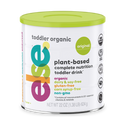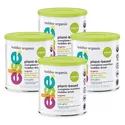7 Signs Your Baby Formula Needs a Change: How to Recognize Feeding Issues
Updated December 2, 2024

Discover the key signs your baby's formula might not best fit their nutritional needs.
One of the most challenging aspects of having an infant is learning to figure out what they need, especially regarding feeding issues. However, while your baby can’t tell you with words that something is wrong, they can offer other signs that you may need to change their formula.
How to Know Which Formula is Right for Your Baby
Not every infant formula will work well for your baby, and that’s okay. But how do you know which one is the right one? The most important factor to consider when switching formulas is to ensure its ability to support your baby's growth and development.
Your baby needs to tolerate the formula well and enjoy drinking it. Otherwise, they don't get the intended benefits of consuming it. Plus, you don’t want your baby to experience an adverse reaction to drinking a particular type of formula.
» Discover our expert tips for finding the right formula for your baby
Choosing the Right Formula
When selecting a baby formula, make sure it aligns with your family's needs and preferences by considering factors like:
- Main protein source
- Ingredients
- Preparation method
Note: If you ever have questions about what formula is best for your baby, it’s a good idea to speak with your child’s pediatrician or a registered dietitian specializing in pediatrics for tailored advice.
» Learn more about ingredients to avoid in baby formula
Signs Formula Works Well With Baby
Knowing if a formula works well for your baby is also helpful before we get into signs that you may need to switch formulas. Some signs include having at least five wet diapers and at least 1 to 2 bowel movements per day, signs of average growth at wellness visits, and an overall relaxed and satisfied demeanor after eating.
7 Signs that Formula Doesn't Agree with Baby
Once you’ve chosen a baby formula, this is when somewhat of an experimental period begins.
It's normal for babies to tolerate formula for a while, and eventually, something changes, and you notice that a change may need to be made. Some signs that your baby may need a formula change include:
1. Diarrhea
A baby’s poop is constantly changing, especially as its digestive system continues to develop and be exposed to new things. It’s also common for bowel movements to change when your baby gets sick or stressed.
However, if your baby has constant diarrhea or watery stools, especially after feeding, it’s time for baby formula alternative.
» Explore the best alternatives to baby formula
2. Excessive Fussiness
Being fussy sometimes is a typical trait for all babies. But when it becomes more frequent than usual, it's often a result of your little one being hungry or unsatisfied. It can also indicate their body is uncomfortable or in pain, bringing us to the next point.
3. Gas
Along with changes in bowel movements, like having diarrhea after eating, an increase in gassiness can also be a sign that your baby’s formula isn’t agreeing with them. This may be accompanied by abdominal bloating and firmness of the belly. If so, contacting your pediatrician to determine the best steps is a good idea.
» Find out when changing formula may help a gassy baby
4. Trouble sleeping
Along the same lines of things that can cause your baby to be fussy, being uncomfortable or hungry can also interrupt normal sleep patterns. Babies are supposed to sleep a lot in the early months of life, so it could be a formula issue if they’re not.
Consider how their formula may contribute, especially when trouble sleeping is paired with general fussiness and other signs of discomfort or discontent during the day.
» Discover tips to establish a healthy sleep schedule
5. Rash
Baby skin is sensitive and can change daily depending on the environment. For instance, if it’s hot, humid, or cold, this can all impact the appearance and texture of the skin. Reactions to formula can also cause skin changes, like rashes form.
If you notice a new rash forming and are unsure what could be causing it, it’s always best to speak with your child’s pediatrician. It’s possible that the skin could be reacting to the formula and require a change.
6. Wheezing after eating
If your baby wheezes after eating, this is generally an indication that the formula is causing mucus to build up and irritate the chest. If this is the case, it is not a normal response to eating, and a formula change would be warranted.
Plus, reactions like wheezing or a rash can indicate that your baby is having an allergic response to something in the formula. Common allergens can include cow’s milk and soy allergy.
Note: This reaction may be a sign of a more serious issue, and if your baby is showing signs of difficulty breathing when eating, it’s essential to get medical attention immediately.
» Uncover what soy intolerance symptoms are in kids
7. Vomiting
All babies spit up after eating at some point in their infancy. Particularly when they first start taking the formula and/or breast milk. This is normal. What’s more indicative of a possible formula issue is when the baby is regularly vomiting after a meal and is uncomfortable with it.
For instance, if your baby is forcefully vomiting in a way that shows its body is trying to rid itself of something. This is a more immediate cause for concern, as vomiting their formula isn’t just a discomfort to your baby but also prevents them from getting the nutrients and fluids they need from meals.
» Check out a step-by-step guide for supplementing your baby with formula at night
What Are Some Baby Formula Options?
When you decide to switch your baby to another formula, choosing an option you feel good about is the most important thing.
When comparing formulas, prioritize trusted brands and ingredients you're comfortable with. Baby formula options to consider in terms of ingredients are:
- Cow’s milk: Most common type. It's generally iron-fortified.
- Soy: Great for plant based families or babies with lactose intolerance.
- Protein hydrolysate: Made with protein broken down more than usual to make it more digestible for babies.
- Sensitive formulas: Recommended for babies who are spitting up, have more gas than usual, or are experiencing a lot of overall fussiness. Generally, milk-based, easily digested formulas.
Trusted brands like Else Nutrition now offer plant based infant formula options with wholesome ingredients like almonds, buckwheat, and tapioca. These formulas are great if you're looking for a sustainable, plant-powered approach.
What To Know About Switching to a Sensitive Formula
When switching to a sensitive formula, remember a few things. The symptoms discussed above, such as diarrhea, extra gassiness, general fussiness, and discontent, are often signs that your baby needs to try a sensitive formula.
While most babies tolerate a standard formula with no significant issues, this doesn’t mean anything is wrong with your baby if that’s not the case for your family.
Note: Many babies are sensitive or intolerant to lactose or do not accept plant based soy formula well; you can often address this issue by making a sensitive switch.
» Read this blog to learn about sensitive formula and its benefits for babies with special diets
What Should You Do Before Switching?
Before switching formulas, always speak to your child’s pediatrician to ensure they have been appropriately examined for other potential health concerns.
Additionally, they may recommend a specific formula to try first, based on the one you’re trying to wean your baby away from.
The pediatrician may also recommend speaking with a registered dietitian specializing in pediatric nutrition. Many parents and babies need help with formula-changing needs, so you can rest assured that they have adequate experience and expertise in this area.
How to Switch to a Different Formula
When switching your baby to a brand new formula, take it slowly so as not to create more problems inadvertently. Even when your baby is hungry, big feedings can exacerbate symptoms.
Instead, try to feed your baby in small amounts in a more frequent feeding pattern, and increase the volume gradually as tolerated. Feeding in a slow progression is best.
Pro tip: As part of the formula-changing process, you can apply gentle pressure to your baby’s stomach to help alleviate any gas buildup. This can be done with your hands or during tummy time on the floor. Be sure to wait at least 30-60 minutes after a feeding to do this to allow enough time to digest the formula.
» Find out exactly how much formula to give when supplementing
Is It Time for a Formula Change?
Many signs may indicate your baby needs to change formulas, ranging from fussiness to skin changes or digestive issues. The best way to determine whether a formula change is appropriate and decide which makes the most sense is to speak with your pediatrician or pediatric dietitian for individually tailored guidance.
*The content and advice provided in this article is for informational purposes only and is not a substitute for medical diagnosis, treatment, or advice for specific medical conditions. Always consult a pediatrician to understand the individual needs of your child.














